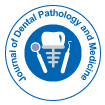Nosso grupo organiza mais de 3.000 Séries de conferências Eventos todos os anos nos EUA, Europa e outros países. Ásia com o apoio de mais 1.000 Sociedades e publica mais de 700 Acesso aberto Periódicos que contém mais de 50.000 personalidades eminentes, cientistas de renome como membros do conselho editorial.
Periódicos de acesso aberto ganhando mais leitores e citações
700 periódicos e 15 milhões de leitores Cada periódico está obtendo mais de 25.000 leitores
Indexado em
- Google Scholar
- ICMJE
Links Úteis
Diários de acesso aberto
Compartilhe esta página
Abstrato
Assessing the degree of acceptance of dental treatments by children and adolescents through the use of behavioural treatment techniques
Madalina Croitoru
The purpose of this paper was to determine if behaviour management can modify in a positive manner the degree of acceptance of dental treatment in children and adolescents and to assess the influencing factors of the patients’ behavioural pattern.
One of the cornerstones in practicing paediatric dentistry is the ability to guide children positively throughout their dental experience and encourage positive dental attitude in order to improve their oral and overall health. Anxiety associated with the dental procedures can be reflected in the child’s behaviour. Therefore, it is important for dentists to evaluate psychological personal traits and to modify the management approach to reduce their anxiety.
A cross-sectional study was performed on 312 children aged 2 to 14 years (m.a. 6.44±0.19 years) attending the Pedodontics Dental Clinic of the “Carol Davila” University of Medicine and Pharmacy in Bucharest, Romania for routine dental care. The improvement of the patients’ behavioural pattern was attempted using the “tell-show-do” technique, positive reinforcement, ART technique, voice modulation, systematic desensitivation, non-verbal communication and behavioural modelling. Their behaviour was evaluated using Frankl’s scale at every visit at the clinic. Statistical analysis was performed using PSPP 1.2 afp005.
A positive modification of the behavioural pattern was recorded in 93.7% of cases. The main factors influencing the behavioural pattern were age and the use of ART techinique (p<0.05).
Behavioural treatment can be a valuable tool in improving the acceptance of dental treatments in children and adolescents
Diários por Assunto
- Agro e Aquicultura
- Alimentação e Nutrição
- Bioquímica
- Ciência da Computação
- Ciência de materiais
- Ciencias ambientais
- Ciências Clínicas
- Ciências Farmacêuticas
- Ciências gerais
- Ciências Médicas
- Ciências Sociais e Políticas
- Ciências veterinarias
- Economia e Contabilidade
- Enfermagem e cuidados de saúde
- Engenharia
- Engenheiro químico
- Física
- Genética e Biologia Molecular
- Geologia e Ciências da Terra
- Gestão de negócios
- Imunologia e Microbiologia
- Informática
- Matemática
- Química
Revistas clínicas e médicas
- Anestesiologia
- Assistência médica
- Biologia molecular
- Cardiologia
- Cirurgia
- Dermatologia
- Diabetes e Endocrinologia
- Doenças infecciosas
- Enfermagem
- Fisioterapia e Reabilitação
- Gastroenterologia
- Genética
- Hematologia
- Imunologia
- Medicamento
- Medicina Reprodutiva
- Microbiologia
- Nefrologia
- Neurologia
- Odontologia
- Oftalmologia
- Oncologia
- Ortopedia
- Pediatria
- Pesquisa Clinica
- Pneumologia
- Psiquiatria
- Toxicologia

 English
English  Spanish
Spanish  Chinese
Chinese  Russian
Russian  German
German  French
French  Japanese
Japanese  Hindi
Hindi